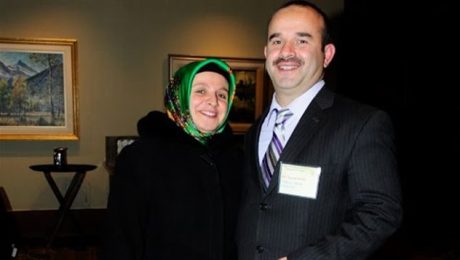Keyword: Turkey

Calgary man accused of helping plot Turkish coup
The photo that reportedly shows Hanci with Gulen is not actually Hanci. Hanci works as an imam for Corrections Canada and Alberta Government Correctional Services, according to Malik Muradov, executive director of the Intercultural Dialogue Institute of Calgary, who added that he also volunteers much of his time to the Turkish community.

No evidence Gulen movement is guilty of subversive activities
The suggestion that Mr Gulen intends to create a new religious political order in Turkey is untrue. He has spoken against political Islam and has always supported a democratic system. In one of his speeches, he explained: “Islam does not propose a certain unchangeable form of government or attempt to shape it.

The Battle For Turkey’s Soul
It is ironic and tragic that at a time when the world is in dire need of a liberal-moderate Islamic movement in its fight against Wahhabi-Salafi inspired global Islamic terrorism, the Erdogan regime is bent upon destroying the Gulen movement by labelling it as “terrorist”.

Turkish-American community grapples with Turkey coup’s aftermath
Dr. Gokcek said he is not optimistic. He is fearful about the growing tensions in the country and coup sympathizers who might be stigmatized as traitors. On a basic level, Gokcek said, he has been able to sit down and eat with other Turkish-Americans with whom he might not always agree. “Some of those friends, I might not be able to now,” he said.

Erdogan Uses Coup Like Hitler Used Reichstag Fire, Austrian Far-right Leader Says
Turkey’s failed coup and Turkish President Tayyip Erdogan’s subsequent purges of state institutions are reminiscent of the Reichstag fire in Nazi Germany and its use by Hitler to amass greater power, the head of Austria’s far-right Freedom Party said.

Astonishing questions about the failed coup attempt in Turkey
Many people watching the stunning events in Turkey believe that the coup attempt was nothing but a pure ‘theater.’ The leader of the coup was a pro-Erdogan General Mehmet Disli, brother of AKP deputy Saban Disli, who defines himself as Erdogan’s confidante. The poorly-planned coup attempt has started with the capture of Istanbul’s Bosporus Bridge. […]

Inside the eye of Turkey’s political storm, in rural Pennsylvania
A moderate preacher rooted in the Sufi mystic tradition of Islam, Mr. Gulen is known for emphasizing interfaith dialogue. But Mr. Erdogan calls Mr. Gulen and his followers a “cancer” and a “terrorist organization” that is building a “parallel state.” The rancour is personal.

The Guardian view on the week in Turkey: coup – and counter-coup?
Now, with the European convention on human rights suspended and a six-month state of emergency that allows President Recep Tayyip Erdoğan to rule without parliament – although thousands still turn out nightly in his support – some are beginning to wonder if the cure has turned out to be little better than the original threat.

Closer look at empire of cleric accused in Turkey coup attempt
Turkey’s crackdown of those suspected in the failed July 15 military coup widens, with the firing of 492 people at its top Islamic authority. Turkish President Recep Tayyip Erdogan is zeroing in on a Muslim cleric living in rural Pennsylvania, whom he accuses of masterminding the coup attempt.

A reality check on [Turkey coup attempt] from America’s spy chief
Asked whether Turkish allegations that cleric Fethullah Gulen planned the attempted coup passed the “smell test” of credibility, National Intelligence Director James Clapper answered: “No. Not to me.” He said that Secretary John Kerry “was right on the ball” to press the Turks to back up their extradition request with evidence of Gulen’s involvement.

Erdogan to become an all-powerful democratically elected dictator
Turkey’s failed coup last week has emboldened President Tayyip Erdogan to become an all-powerful democratically elected dictator. The attempt by his opponents to take over the state by force provided him the political cover to destroy all remaining opposition to his rule without no fair judicial process.

Turkey Coup: Erdogan Uses Stalinist Measures To Crack Down On Education
In rhetoric reminiscent of the Stalinist purges, Erdoğan promised to “cleanse all state institutions”, rid Turkey’s judiciary of “cancer cells” and purge state bodies of the “virus”that has spread throughout Turkish state structures.

The Gulen Movement Is Not a Cult — It’s One of the Most Encouraging Faces of Islam Today
How will it end? Erdogan has beaten Hizmet decisively. But he is planting the seeds for his own destruction. How and when he will fall remains unclear. Meanwhile, on the international scene, Turkey is rapidly becoming a pariah. The country itself is now his primary victim.



















